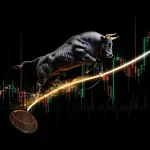
Hot Stocks Right Now: Don’t Miss These Winners!
Mar 28, 2025
If you follow the crowd, you will inevitably end up exactly where the crowd always does—in the abyss of panic and regret. History has proven time and again that the greatest danger to your wealth comes not from market volatility itself, but from the irrational herd behaviour driven by fear and greed. Today, more than ever, investors must break free from conventional thinking and cultivate an independent, contrarian mindset. The difference between financial ruin and strategic advantage lies not in perfect market timing, but in understanding the profound psychological dynamics that shape human decisions. The question is not whether markets will fluctuate—they always do—but whether you will be prepared to seize opportunities when others flee in panic.
In modern financial markets, emotion often outweighs reason. Investors, driven by primal instincts rather than disciplined strategy, respond excessively to short-term market movements. From the speculative frenzy of the dot-com bubble to the widespread panic during the 2008 financial crisis and the COVID-19 pandemic crash of 2020, collective emotions have repeatedly led to irrational price movements and catastrophic losses for the fearful herd. Yet, within these chaotic periods, skilled investors who understand the psychological undercurrents can spot hidden opportunities, turning collective panic into profitable advantage.
The Power of Emotion in Market Behaviour
Markets are not merely reflections of economic fundamentals; they are reflections of human psychology. At their core, emotions—particularly fear and greed—drive investment decisions far more powerfully than rational analysis. The Fear and Greed Index, a simple yet powerful indicator, captures this emotional pulse in real-time, revealing the collective mood of market participants.
Fear, anchored deeply in our evolutionary psychology, triggers irrational selling during downturns. Investors are hardwired to avoid losses, often at the expense of rational analysis. Loss aversion, the cognitive bias where losses feel psychologically twice as powerful as equivalent gains, exacerbates panic selling. During periods of crisis, investors instinctively prioritise immediate emotional relief over long-term strategic thinking, liquidating positions indiscriminately, often at the worst possible prices.
Conversely, greed drives speculative bubbles. The allure of easy profits seduces investors into ignoring risks, fuelling euphoric buying frenzies disconnected from fundamental valuations. Confirmation bias—the tendency to seek information that supports pre-existing beliefs—amplifies speculative behaviour, reinforcing collective optimism even as risks mount. Eventually, reality asserts itself, bubbles burst, and greed turns swiftly into panic.
Understanding this emotional cycle provides investors with critical insight. Recognising that collective fear often signals undervalued opportunities, while collective greed warns of mounting risk, empowers investors to act strategically rather than emotionally. The great investors of history—Buffett, Graham, Livermore—mastered precisely this psychological discipline, turning emotional extremes into profitable advantage.
Contrarian Courage: Turning Panic into Profit
Contrarian investors deliberately act opposite the prevailing market sentiment. They buy when others sell, and sell when others buy. This approach requires not only intellectual conviction but also emotional fortitude. Contrarians must resist deeply ingrained psychological instincts, maintaining discipline and clarity precisely when emotional pressures peak.
During the 2008 financial crisis, Warren Buffett exemplified contrarian courage. Amidst widespread panic selling and collapsing asset prices, Buffett strategically invested billions into distressed banks and companies. His disciplined analysis revealed substantial undervaluation, despite collective pessimism. As markets stabilised and recovered, Buffett’s contrarian positions yielded exceptional returns, demonstrating the profitability of disciplined psychological resilience.
Similarly, during the COVID-19 market crash, contrarian investors recognised panic-driven selling as an opportunity rather than a threat. Companies with strong fundamentals, temporarily discounted due to emotional fear, offered significant long-term value. Investors who maintained psychological clarity and disciplined investment strategies during this volatile period profited significantly as markets rebounded swiftly.
Hot Stocks Right Now: Contrarian Opportunities
Identifying contrarian investment opportunities requires diligent fundamental analysis combined with deep psychological insight. During periods of market volatility, the following companies have emerged as compelling contrarian candidates, offering attractive valuations and strong fundamental profiles amidst emotional market swings:
| Company | Ticker Symbol | Recent Price (USD) | 52-Week High (USD) | Market Sentiment |
|---|---|---|---|---|
| Alphabet Inc. | GOOGL | $130 | $151 | Fearful |
| JPMorgan Chase | JPM | $140 | $159 | Neutral/Fearful |
| Apple Inc. | AAPL | $181 | $199 | Neutral |
| Microsoft Corp. | MSFT | $375 | $393 | Greedy |
Contrarian investors might particularly focus on Alphabet and JPMorgan Chase, currently experiencing fearful or neutral sentiment despite strong fundamental positions. Alphabet, despite short-term headwinds, maintains dominant market positions, robust profitability, and a fortress balance sheet. JPMorgan, a financial powerhouse, often faces temporary price declines during market volatility despite solid long-term prospects.
Advanced Contrarian Strategies: Options and LEAPS
Beyond traditional equity purchases, sophisticated contrarian investors can capitalise on emotional volatility using advanced strategies like options trading. Selling put options during volatility spikes allows investors to generate significant premium income, effectively monetising collective fear.
During market panics, implied volatility—the market’s expectation of future price movements—rises dramatically, inflating options premiums. Investors who sell cash-secured put options on fundamentally strong companies during these periods capitalise on elevated fear-driven premiums. If underlying asset prices remain stable or rise, investors retain premium income. If prices decline further, investors acquire shares at attractive discounted valuations, positioning themselves advantageously for eventual market recoveries.
Furthermore, investors can reinvest these inflated put option premiums into long-term equity anticipation securities (LEAPS)—long-dated call options providing leveraged exposure to potential market rebounds. This combined strategy enables investors to generate premium income during periods of fear-driven volatility while simultaneously establishing leveraged positions benefiting from future market recovery.
Discipline and Risk Management: Essential Contrarian Foundations
Contrarian investing, while offering substantial profit potential, requires rigorous discipline and prudent risk management. Reckless contrarian behaviour can lead to devastating losses. Investors must clearly define risk tolerance, establish disciplined position sizing, and maintain diversified portfolios.
Position sizing is crucial—investors should incrementally allocate capital, particularly during volatile markets. Averaging into positions systematically, rather than attempting to predict exact market bottoms, mitigates risk and reduces emotional pressure. Predefined criteria based on valuation metrics and fundamental strength help investors maintain discipline during emotional market extremes.
Regular portfolio reviews and rebalancing ensure alignment with long-term investment objectives, preventing emotional reactions from distorting portfolio strategy. Psychological resilience further complements disciplined risk management. Investors must cultivate emotional detachment from short-term market fluctuations, anchoring decisions in strategic objectives rather than emotional impulses.
The Empowerment of Independent Thinking and Strategic Clarity
Ultimately, embracing contrarian investing empowers investors to transcend emotional herd behaviour, cultivating independent thinking and strategic clarity. Recognising how collective emotions shape market decisions enables investors to resist biases, making deliberate, informed choices based on rational analysis.
Independent thinking requires challenging prevailing market narratives, questioning conventional wisdom, and remaining open to contrary evidence. Investors must develop frameworks for rigorous analysis and disciplined execution, enabling confident navigation of markets even amidst emotional extremes.
Fostering strategic clarity involves clearly defining investment goals, understanding personal risk tolerance, and establishing disciplined processes for decision-making. Investors should explicitly account for emotional biases, incorporating safeguards against irrational reactions during volatility, ensuring clarity and decisiveness even during turbulent market periods.
Conclusion: Transforming Collective Panic into Strategic Advantage
The Market Fear and Greed Index provides profound insights into human psychology and market behaviour. By understanding how emotions shape investor choices, individuals gain powerful tools for navigating financial markets effectively. Embracing contrarian wisdom, employing advanced strategies like options trading, and maintaining disciplined risk management empower investors to transform collective panic into strategic advantage.
Yet, beyond financial markets, these insights offer broader lessons for navigating uncertainty in all areas of life. Recognising emotions’ pervasive influence enables individuals to make deliberate, informed choices rather than reactive decisions driven by fear or impulsivity. Cultivating psychological resilience, independent thought, and strategic clarity empowers individuals not merely to survive volatility but to thrive because of it.
In embracing these insights, investors do more than generate profits—they develop a mindset of self-awareness, discipline, and strategic intentionality. This perspective allows individuals to harness emotions rather than being controlled by them, unlocking new possibilities for growth, success, and fulfilment.
Ultimately, you face a clear choice: remain captive to emotional market behaviour or harness the power of contrarian investing to invest with confidence, clarity, and strategic foresight. In doing so, you transform volatility from threat into opportunity, positioning yourself for enduring success in markets and life alike.
Contemplative Journeys: Stimulating Articles












